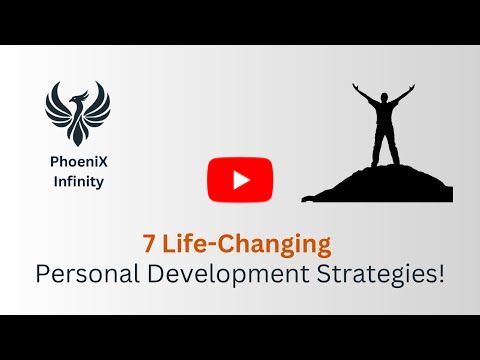7 Ways to Transform Your Life (Starting Today!)
Introduction
Hello everyone, welcome back to the weekly newsletter! I’ve noticed a growing wave of people wanting to make real, lasting changes in their lives—both at work and beyond. Maybe you’ve felt stuck in old routines or wished you had a clear blueprint for personal growth. Trust me, I’ve been there, too. Today, I want to show you that the power to transform your life doesn’t come from luck or guesswork—it comes from concrete steps you can take right now.
In this edition, we’ll explore seven strategies that can unlock your full potential and guide you toward a more fulfilling life. Whether you're a self-improvement pro or just starting, these methods work. They address our core: our values, habits, and mindset. Let’s dive in!
7 Ways to Transform Your Life
Too often, we look at people who’ve achieved greatness and assume they had some special advantage or a magic formula. But the truth is, real, sustainable change starts with consistent, simple actions. Each of these seven strategies is designed to help you find clarity, build better habits, and take control of your future.
1. Define Your Core Values and Vision
Think of your values as the compass that directs every decision you make. If you’re unclear about what truly matters to you, it’s easy to get swept away by other people’s expectations or the “trend of the moment.” Write down three guiding principles—like family, creativity, or growth. Based on these values, what does your ideal future look like? Reflect on what your vision is 5 years from now and set the long-term goals that reflect this picture. This ensures your efforts align with who you are and where you want to go.
2. Embrace a Growth Mindset
Carol Dweck’s research teaches us that embracing challenges can be a fast track to self-improvement. A growth mindset encourages you to view failures as lessons, not setbacks. Instead of feeling embarrassed by a mistake, ask what you can learn from it. Next time, if things don't go as planned, take five minutes to reflect. Think of a fix instead of calling yourself "not good enough" or "a failure." Over time, this mindset shift can drastically alter how you approach both your personal and professional life. Many of the most successful people don’t just avoid failure; they often risk more and more because they know that they will fail many times. But they will also learn something many times.
3. Practice Regular Reflection
It doesn’t need to be long, but set that time for yourself to review how your life and your key projects progress. Every week, and ideally quickly every day, ask yourself what went well, what could have gone better, and what you’re grateful for. It can be at the end of your workday or part of your evening routine. Writing it down can help you a lot to crystallize your thoughts. If you choose to, keep a small notebook by your bed, or use a note-taking app if you prefer typing. Jotting down even a single sentence about each of these questions can help you track your progress and maintain a positive outlook. Adding a quick “thank you” text or note to someone who helped you can also strengthen your relationships and keep you inspired.
4. Learn Continuously
We often think learning stops when we graduate from school, but that’s only the beginning. Learning something new, like a language, coding, or a hobby, can spark ideas and boost your confidence. Even 30 minutes a week can help. It can help you get out of the boring routine of day-to-day life and expand your horizons. If you’re not sure where to start, consider something that aligns with the core values you identified in Step 1. Perhaps it’s a cooking class if you value health, or a leadership webinar if you want to grow professionally.
5. Master Time Management
Time is the one resource you can’t get back and is definitely way more valuable than money. Most people in their 20s and 30s dream of being rich, and most rich people dream of being back in their 20s or 30s. Think of your time like an investment, like money. Using it wisely can be the difference between feeling frazzled and feeling fulfilled. One powerful tool is the Eisenhower Matrix, which helps you categorize tasks by urgency and importance. Another trick is to visualize your available time. If you consider how many months and years you might have left in your working life, how does that change your daily schedule? Try focusing more on Quadrant 2—“Not Urgent but Important”—to invest in long-term growth and avoid future crises. In resources, you will find an example of the Eisenhower Matrix.
6. Build Strong Habits
Habits are the building blocks of your daily life. In one of the previous newsletters, I recommended “Atomic Habits” by James Clear, who is the top expert in this area. The key is consistency over intensity. It’s better to read one page a day than none at all. It’s more effective to do a short, 10-minute workout daily than to burn out trying an hour-long session you can’t maintain. If you miss a day, don’t miss two in a row. That’s how you prevent a one-time slip from derailing your progress. Over weeks and months, these small but steady actions add up to major results.
7. Seek Accountability
It’s a lot easier to stay on track when someone else has your back. Share your goals with a close friend, join a local study group, or find an online mentor who can offer feedback and encouragement. Accountability adds structure to your goals and makes them more concrete. It also creates a support system that can give you a nudge when your motivation dips. Growth might be personal, but you never have to navigate it alone.
Actionable Tip: Pick one strategy from the list. Spend the next week focusing on it daily. Maybe you define your core values, start a gratitude journal, or block out time for a new skill. By the end of the week, notice how even a small shift in focus can create a ripple effect throughout your life.
|
Inspiration & Personal Growth
“Your life does not get better by chance, it gets better by change.” ― Jim Rohn
I often talk about how one single, conscious choice can spark a remarkable chain reaction. Jim Rohn’s words remind us that real progress isn’t about hoping life will magically improve on its own. It’s about deciding what you want, then making intentional shifts to get there. Each time you adopt a new habit, set a clear boundary, or decide to learn a fresh skill, you move closer to the life you’ve envisioned.
…or further.
Change can feel uncomfortable, but it’s the one force that continuously shapes who we become. Embrace it, and watch as new possibilities unfold.
Resources & Recommendations
-
Tool: Habitica – A fun app that turns your daily tasks and goals into a role-playing game, rewarding you for consistency.
-
Book: “The Miracle Morning” by Hal Elrod – A simple but impactful set of routines that can jump-start your day and keep personal development on track.
-
Tool: Eisenhower Matrix. It is a life-changing way to view your priorities. It helps you prioritize tasks on a matrix of urgency and importance.

PS: Based on your PhoeniX Way onboarding, you get this template, among others, for free as part of the Bronze Level: Establish Foundations.
Behind the Scenes: Launch of PhoeniX Finance
I’m excited to pull back the curtain on a new direction I indicated in this section last week. Many of you come from finance backgrounds (similarly to me), and I want to extend PhoeniX into the finance area as well.
You would have received an announcement email if you wanted to get your hands on it (it’s free). I’ve spent years perfecting a strategic finance transformation framework. It helps me outline and prioritize strategies to elevate my finance teams. It's most useful for finance managers and above. But even junior staff and non-finance folks can benefit. It can help you see how your role fits into the bigger finance picture.
Check the separate email for it or find it in the link below:
 |
PhoeniX Strategic Finance Strategic framework for finance leaders to transform their functions, grow as strategic business partners and truly fulfill their role in... www.phoenixinfinity.co.uk |
Summary
Remember, no one changes overnight. But if you consistently focus on these seven strategies, you can make radical shifts in how you live and work. Small steps create big momentum. If you like the challenge, pick just one strategy from this newsletter and act on it today. Maybe that’s setting an alarm to journal before bed or signing up for that hobby you’ve been postponing for a while.
Whatever you choose, act on it now!
Until next time,
PhoeniX Team








Responses